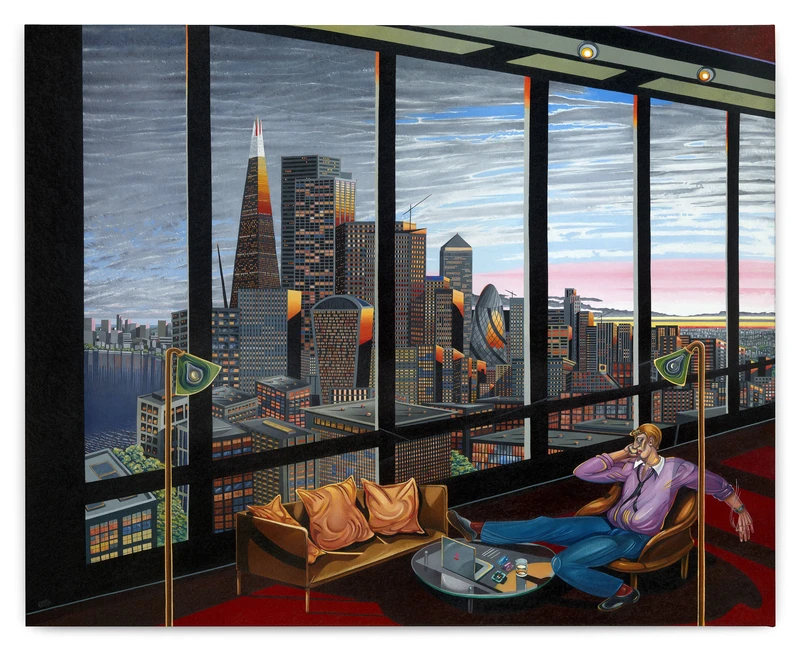The Place I Am
24 Nov-22 Dec 2023
PV 23 Nov 2023, 6-8pm


Stephen Friedman Gallery presents The Place I Am, a group show celebrating its gallery artists and the breadth of the programme. Bringing together new and previously unseen paintings, sculptures and works on paper, the exhibition takes its name from Peter Bennet’s eponymous poem, which examines the link between identity and sense of place.
Artists include Mamma Andersson; Juan Araujo; Tonico Lemos Auad; Leilah Babirye; Jonathan Baldock; Stephan Balkenhol; Sarah Ball; Claire Barclay; Caroline Coon; Melvin Edwards; Andreas Eriksson; Manuel Espinosa; Denzil Forrester; Tom Friedman; Kendell Geers; Sky Glabush; Pam Glick; Jeffrey Gibson; Wayne Gonzales; Hulda Guzmán; Channing Hansen; Holly Hendry; Thomas Hirschhorn; Jim Hodges; Izumi Kato; Ilona Keseru; Rivane Neuenschwander; Woody De Othello; Ged Quinn; Deborah Roberts; Anne Rothenstein; Yinka Shonibare CBE RA; David Shrigley; Jiro Takamatsu; Caroline Walker; Kehinde Wiley; Clare Woods; Yooyun Yang and Luiz Zerbini.
The second exhibition to take place at the gallery’s new location on Cork Street, the show explores how home can exist beyond its physical place. The gallery is a home; a community where geographically and stylistically diverse influences gather and thrive.
Works by Andreas Eriksson, Sky Glabush, Pam Glick and Luiz Zerbini are inspired by the landscapes immediately around them and are diverse visual representations of their settings. Inspired by his rural surroundings in Sweden, Eriksson devises meditative paintings that provide a window onto the outside world. Also rooted in abstraction, Glick’s colourful grids and mazes project the energy of Niagara Falls, just a few miles away from her studio. Also working in bright and luminous colours, Zerbini’s joyful depictions of the lush and tropical flora and fauna in Brazil are juxtaposed with Glabush’s hypnotic and mysterious landscapes.
Dreamlike and surreal representations of place feature throughout the presentation. Caroline Coon’s large new painting, Dawn in the City: Is Ziki available... ? (2023), is a continuation of her ongoing series portraying brothels and sex workers. Having worked for a short time in the industry, Coon now paints these scenes through a feminist lens, destabilising the hierarchy between sex workers and their male customers. In this painting, a seemingly exhausted city-worker is seated before an imagined version of London, making an early morning call.
Similarly surreal, with a particular focus on interiors, Mamma Andersson also presents a new painting. The artist is inspired by filmic imagery and theatre sets. Typical of Andersson’s practice, the piece features silhouetted details, thick paint and textured washes.
Caroline Walker has a continued interest in the dynamics of family life and, in particular, the role of women in contemporary society. Exploring the sense of belonging, the artist presents ordinary scenes of everyday life that spotlight the frequently overlooked work that women do. Sarah Ball’s practice is focused on gender and identity, with sensitive and intimate portrayals of her subjects. In this new work, Edie (2023), Ball depicts her daughter. A monumental new work by Kehinde Wiley also features in the exhibition. The artist’s vibrant and naturalistic paintings of contemporary African-American and African-Diasporic men and women subvert the hierarchies and conventions of classical portraiture.
Wayne Gonzales’ meticulously crosshatched paintings examine the American cultural landscape. In this new painting, the artist uses an image of a house as a mirror to reflect the viewer’s own subjectivity. Loaded with associations, the symbol of the house is ambiguous while inviting feelings of nostalgia. Similarly working with memory and sentimentality, Jim Hodges explores themes of love and death, fragility and temporality. Simple and poetic, and executed with minimal means, Hodges’ works express a sentiment of deeply felt experience and encourage a visceral and communal response. The show will, for the first time, feature new gallery artist Clare Woods. Woods’ visceral paintings hover between abstraction and figuration and destabilise traditional art historical genres including landscape, portraiture, and still life.